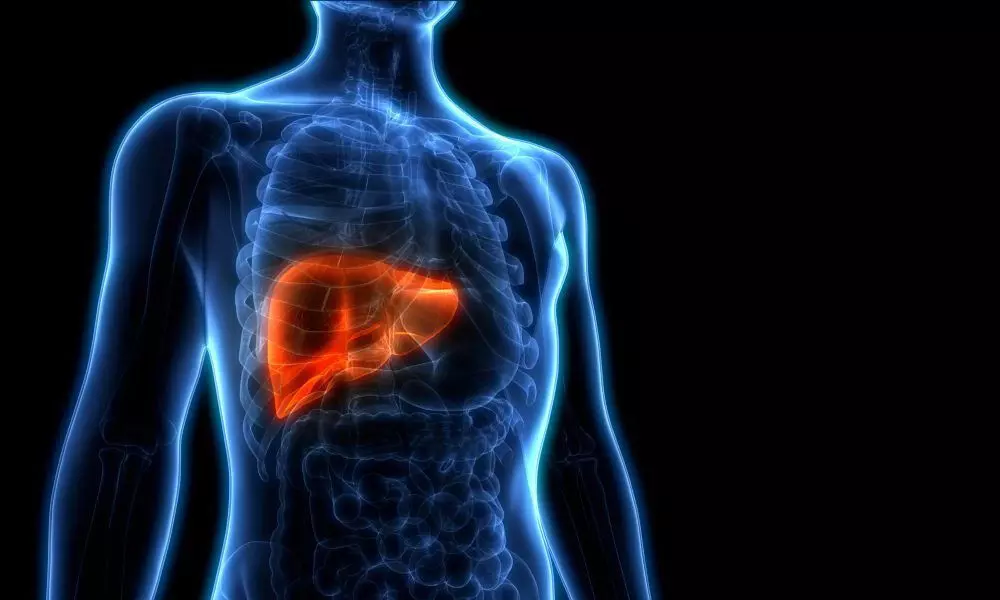Live
- Assam only state to see dip in road accidents: CM Sarma
- MP BJP to celebrate former PM Vajpayee's birth anniversary on Dec 25
- Christmas Eve 2024: Heartwarming Messages To Share With Your Loved Ones
- PM Modi holds brainstorming session with economists in run-up to Budget
- “Telangana Ready to Support AI Technologies That Drive Social Impact,” says Special Chief Secy, Jayesh Ranjan at Woxsen University’s Future Tech Summit 2024
- Hero Motosports Team Rally Announces Squad For Dakar Rally 2025
- Two Men Found Dead In Parked Caravan In Kerala
- Mandhana moves closer to top spot in ODI, T20I rankings
- IND vs AUS Boxing Day Test 2024: Sam Konstas Debuts, Travis Head’s Fitness in Question
- Congress Challenges Election Rule Amendments In Supreme Court
Just In
35% of population in India suffers from fatty liver


35% of population in India suffers from fatty liver
As part of the 'Illness to Wellness' campaign, ASSOCHAM, an apex industry body, conducted a webinar on "Managing Liver Care" with the main objectives to cascade awareness and disseminate wisdom about managing liver care, reducing liver infections and eventually enhancing liver health to lead a healthier, happier and prosperous life.
As part of the 'Illness to Wellness' campaign,ASSOCHAM, an apex industry body, conducted a webinar on "Managing Liver Care" with the main objectives to cascade awareness and disseminate wisdom about managing liver care, reducing liver infections and eventually enhancing liver health to lead a healthier, happier and prosperous life.
Dr Shiv Kumar Sarin, Padma Bhushan awardee, Head, Department of Hepatology and Director, Institute of Liver and Biliary Sciences, New Delhi, told the audience about the increasing number of fatty liver cases in the country and how they are linked to diabetes, kidney stones and rising heart disease rates.
"Thirty-five per cent of the population in India suffers from fatty liver," he added.He explained that when lipids accumulate in the liver, it limits its insulin capability, and to compensate, the pancreas produces insulin, which is insufficient to cope with regular biological processes.
As a result, the body undergoes insulin resistance and a person develops pre-diabetic symptoms. He says that those fats start to enter the blood and get deposited in the arteries directing to the risks of heart stroke or attack. Ample evidence suggests that elevated Gamma-GT enzyme activity is associated with a higher risk of cardiovascular disease.
Dr Rajesh Kesari, Founder and Director, Total Care Control, Delhi-NCR, said liver is termed as the chemical factory of our body, therefore our liver must bear the brunt of our modern-day lifestyle. The role of the liver in maintaining health was known for ages -- but has once again caught attention as the liver is unable to handle the excess fat which is there in our diet and is becoming the reason for many diseases like diabetes, hypertension, atherosclerosis etc.
"Human liver is one of the most important organs in our body performing more than 500 vital functions," said Dr Sakshi Karkra, Head, Pediatric, Gastroenterology and Hepatology, Artemis Hospitals, Gurugram.
It performs many functions like detoxification of drugs, resisting infections by making immune factors, converting poisonous ammonia to urea, processing haemoglobin, protein, cholesterol and glycogen synthesis, regulating blood clotting, production of biochemicals necessary for digestion and excretion of bile which helps carry away waste products from the liver, she added.
She says that liver disease refers to any damage or disorder that limits the function of the liver. It can be genetic (inherited) or acquired. The symptoms range from
fatigue, irritability, headaches, difficulty in concentrating, vomiting, anxiety and in advanced stages causes yellowing of the skin and eyes (jaundice), itchy skin, swelling of the lower abdomen and dark urine.
"The liver can repair itself up to a certain point so damage can be reduced if liver disease is discovered at an early stage," she added.
Sharing his views, Dr Bhavin Bhupendra Vasavada, Surgical Gastroenterologist, Hepato Biliary and liver transplant surgeon, Shalby Multi-Specialty hospitals, said, "Liver has great regenerative power and can fight with the disease until it is damaged beyond repair. It is both a blessing and disguise, as due to some great regeneration capacity, symptoms are not seen unless damage is severe and generally when alarming symptoms are seen, liver transplant remains the only curative treatment. As a result, liver disease treatment should include screening, early identification and prevention. If hepatitis is identified early, there are numerous effective oral therapies available, and a transplant can be avoided."
The major preventive approaches are an emphasis on reducing alcohol addiction, a healthy lifestyle, exercise and obesity prevention."When a liver transplant is required, he says as an educated society, we should focus on expanding organ donor awareness and lowering the cost of treatment for liver transplants." (IANS)

© 2024 Hyderabad Media House Limited/The Hans India. All rights reserved. Powered by hocalwire.com






